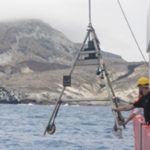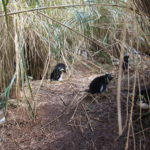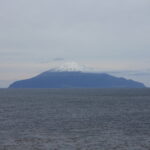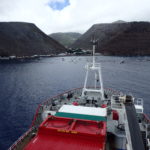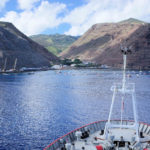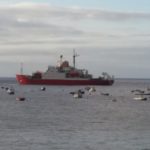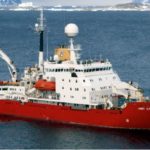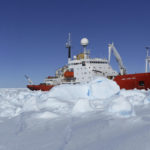The food security and economies of Tristan da Cunha and St Helena, British overseas territories in the South Atlantic, are heavily reliant on marine harvestable resources and, to a lesser degree, tourism. Understanding how vulnerable these resources are to current and future harvesting, the impacts of climate change and species invasion will be key to maintaining the future economic and cultural security of these nations.
The rock lobster fishery at Tristan da Cunha and the tuna fishery at St Helena are important for the islands economies and cultural identities. The Tristan lobster fishery is very well managed and has Marine Stewardship Council certification. However, there is a realisation that developing other sustainable fisheries would improve long-term economic security. Similarly, St Helena need more oceanic research to help them better manage their tuna fisheries.
This three-year project aims to leave a legacy of robust information about the marine ecosystem as well as oceanographic and food web modelling that will provide the scientific information necessary to develop policies to manage marine ecosystem resources, especially those relating to food security and eco-tourism. These will provide tools for the Islanders to manage their marine resources into the future.
As part of the project there are two cruises planned, one on board the RRS James Clark Ross in 2018 and one on board the RRS Discovery in 2019. During the cruises the team will deploy a range of sampling equipment to examine the biodiversity on the sea floor and in the water column. In addition, the ship’s multibeam echosounder will be used to build a detailed picture of the seafloor, which will help to create habitat maps.
Once these habitats have been identified, an underwater camera and small trawl will be used to describe the species present within each habitat. Bongo nets and a rectangular midwater trawl (RMT) will be deployed to sample animals in the mid-depths of the water column.
Identification and further analysis of the specimens, assessing stable isotopes and the genetic connectivity, will help to construct a food-web for the exploited marine populations. Using this information new modelling techniques will be used to identify critical links in the food chain and their potential vulnerability. These links can be used as an early warning sign for the marine ecosystem, highlighting the need for some remedial action in the region.
In parallel to the cruises this project builds on the ongoing sea bird research on the Islands, to help conserve the breeding and feeding grounds of many endemic species. New logger technology will be deployed to map the habitat usage of these species and help to predict vulnerable times and locations that can be the target for conservation measures.
Scientific cruises and land-based fieldwork will be complemented by ocean model simulations, allowing the team to understand the variability and eventually to identify any longer term trends, including climate change signals.
This project is supported by the UK Government Official Development Assistance (UK-ODA). This is one of two British Antarctic Survey projects that are supported by UK-ODA. Find out more about how we are applying our polar expertise to support development here. The project was designed to directly benefit the people of St Helena and Tristan da Cunha, with a strong focus towards economic improvement and protection of biodiversity.
This is a collaboration with multiple partners including the Tristan da Cunha and Saint Helena Governments, the Blue Belt Programme, Cefas, Marine Management Organisation (MMO), UK Hydrographic Office (UKHO), the RSPB, South Atlantic Environmental Research Institute (SAERI), Shallow Marine Survey Group, University of Plymouth and University College London.
Key objectives –
To help provide long-term environmental and economic security through provision of:
- Information on biodiversity to underpin marine protected area designation
- Whole ecosystem environmental and biological information to allow sustainable fisheries management
- Knowledge of food web vulnerabilities
- Training and capability building
19 May, 2021 by David Barnes
This week at Climate Exp0, Dr David Barnes, benthic marine Ecologist at British Antarctic Survey, has discussed the potential for mitigating climate change through nature-based solutions, including sharing collaborative research …
25 October, 2018 by Norman Ratcliffe
Norman Ratcliffe, a seabird biologist at British Antarctic Survey (BAS), studies the biology of seabirds and how this is impacted by climate change. Read this blog to find out about …
13 November, 2020
The UK Prime Minister has announced today (Friday 13 November) a new Marine Protected Zone around the overseas territory of the island of Tristan da Cunha. The move is part …
9 April, 2020
An underwater mountain double the height of the UK’s Ben Nevis has been added to a global map of the seafloor during a research cruise to investigate the marine environment …
12 March, 2019
A team of scientists set sail this week (12 March) for the remote South Atlantic islands of Tristan da Cunha and St Helena. This mission is part of BAS’ commitment …
8 October, 2018
The amount of plastic washing up onto the shores of remote South Atlantic islands is 10 times greater than it was a decade ago, according to new research published today …
26 April, 2018
A team of scientists on board the RRS James Clark Ross (JCR) has conducted marine biodiversity research around the Island of St Helena with a team of UK based and …
16 March, 2018
The RRS James Clark Ross left the Falkland Islands yesterday (15th March) and is travelling towards Tristan Da Cunha, with expected arrival on the 22nd March. The vessel will survey …
One of the world's most advanced polar research vessels
